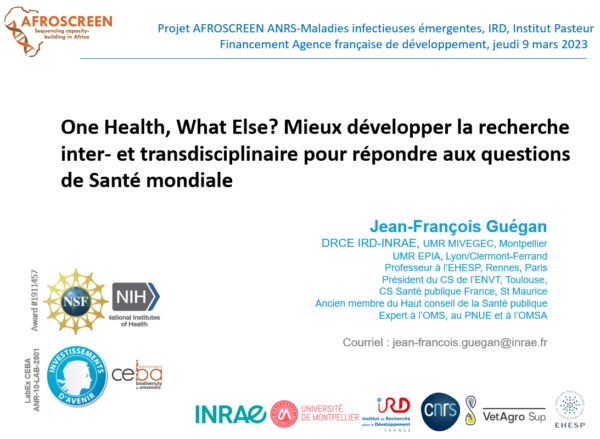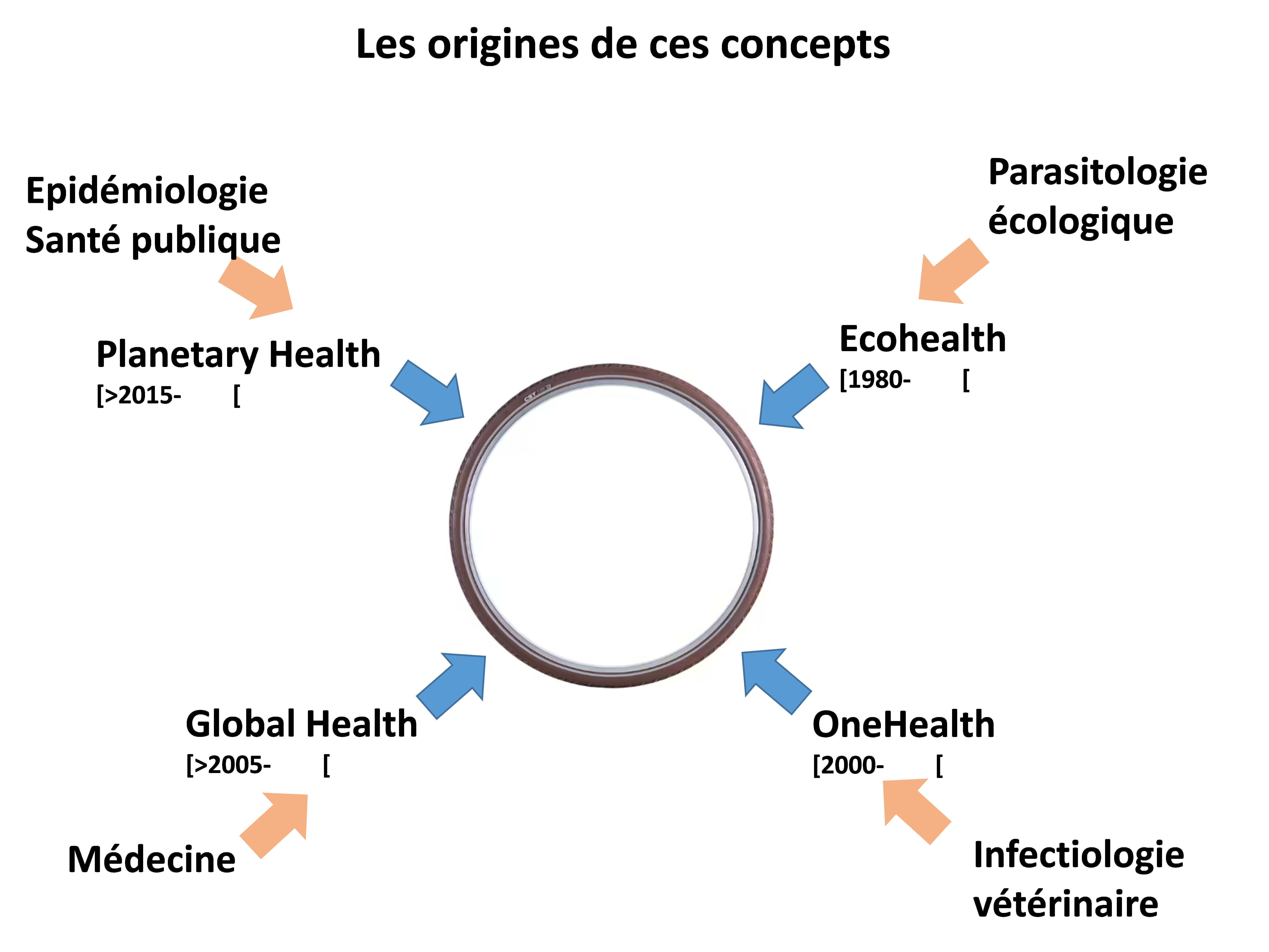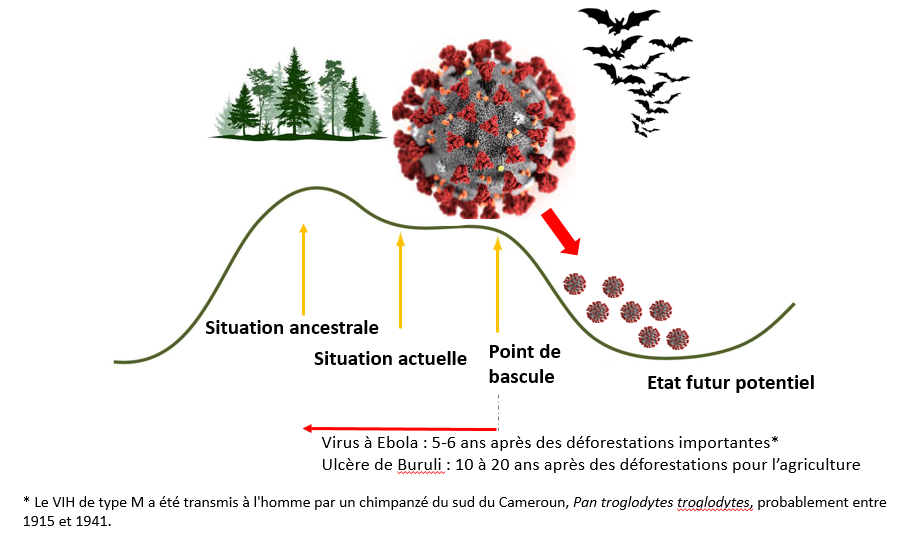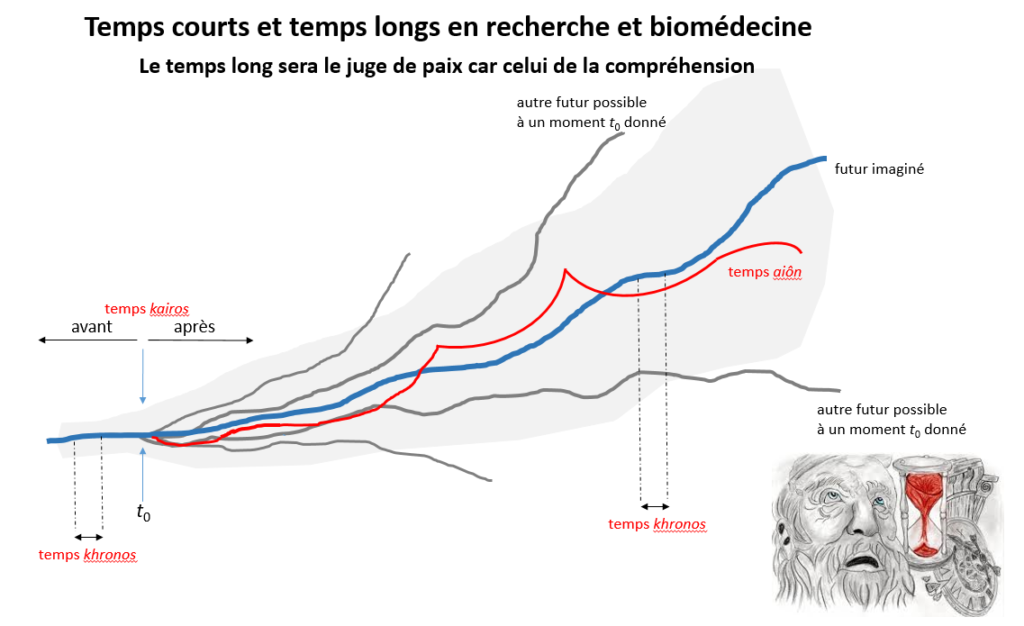A look back at the webinar “One Health. What Else? Enhancing Inter- and Transdisciplinary Research to Address Global Health Issues”
A look back at the webinar “One Health. What Else? Enhancing Inter- and Transdisciplinary Research to Address Global Health Issues”
Dr. Jean-François Guégan, Director of Research of Exceptional Rank (DRCE) at INRAE and IRD, Professor at the École des Hautes Études en Santé Publique (France), and specialist in issues related to the link between climate change, biodiversity and health, spoke to us about the need to better develop inter- and trans-disciplinary research to address global health issues.

Dr. Guégan proposed an overview of the application of the One Health concept in research since its development in the 2000s, and exposed the complexity of this “meta subject”, as well as its biases.
The One Health High Level Expert Panel (OHHLEP) defines the principle One Health as an integrated and unifying approach that aims to balance and sustainably optimize human, animal, and ecosystem health, recognizing that the health of humans, domestic and wild animals, plants, and the environment in general (including ecosystems) are closely linked and interdependent.
Dr. Guégan clarified the distinction between consorts” concepts in health He emphasized how the coexistence of these concepts, which originated from very different parent disciplines, makes it difficult to understand the impact of the new concepts. difficult to apply interdisciplinarity (crossing of several disciplines to overturn dogmas and build new research postulates) or transdisciplinarity (intersection of several disciplines oriented to the translation towards public health policy making). Ultimately, the majority of the research carried out continues to be of a pluri- or multidisciplinary nature (involving several disciplines, but with little exchange between them).

In support of his argument, Dr. Guégan highlighted a study by Folorunso O. Fasinawhich mapped the application of One Health in Africa, showing that the concept is little applied in the continent and that the majority of initiatives remain rather narrow, focused on a single discipline (zoology), and with little involvement of the political sector in decision making and citizen participation in the construction, implementation and restitution of programs.
Dr. Guégan insisted on the importance for research not to stop at the investigation of an animal origin of the main human infectious agents, considering theplant or soil origin of many infectious microbesand “get out of a petri dish”. and work over long periods of time to identify the determinants of the spread of diseases that appear at different levels of life.
Dr. Guégan reiterated the importance of monitoring as dynamic systems are gradually modified (by environmental, demographic, sociological disturbances…) to unpredictable tipping points that reveal the emergences, and that it is human behavior (individual and collective) that multiply the exhibitions with a source infected with an infectious agent of zoonotic or environmental origin that generate an epidemic risk.

Dr. Guégan also denounced how the lack of scientific and medical integrity (conflicts of interest in research, propensity to defend one’s points of view, etc.) sometimes hinders discoveries and progress in knowledge and medicine, blocking the arrival of new ideas in the scientific community.
According to Dr. Guégan, to apply the One Health concept, a collaborative approach should be encouraged to bring certain disciplines together, when appropriate. However, the lack of means, the absence of associated methodology, and the difference in research culture between countries do not always allow this collaboration. In order to encourage its use, it is essential to base this device on people who are committed to transdisciplinarity.
In conclusion, Dr. Guégan insisted on the importance of an integrative understanding in the long term of the phenomena that interact with human, animal, and agricultural infectiology problems, essential to understand the phenomenon of emergence of new infectious agents.

To learn more, watch the entire webinar:
Dr. Guégan proposed an overview of the application of the One Health concept in research since its development in the 2000s, and exposed the complexity of this “meta subject”, as well as its biases.
The One Health High Level Expert Panel (OHHLEP) defines the principle One Health as an integrated and unifying approach that aims to balance and sustainably optimize human, animal, and ecosystem health, recognizing that the health of humans, domestic and wild animals, plants, and the environment in general (including ecosystems) are closely linked and interdependent.
Dr. Guégan clarified the distinction between consorts” concepts in health He emphasized how the coexistence of these concepts, which originated from very different parent disciplines, makes it difficult to understand the impact of the new concepts. difficult to apply interdisciplinarity (crossing of several disciplines to overturn dogmas and build new research postulates) or transdisciplinarity (intersection of several disciplines oriented to the translation towards public health policy making). Ultimately, the majority of the research carried out continues to be of a pluri- or multidisciplinary nature (involving several disciplines, but with little exchange between them).

In support of his argument, Dr. Guégan highlighted a study by Folorunso O. Fasinawhich mapped the application of One Health in Africa, showing that the concept is little applied in the continent and that the majority of initiatives remain rather narrow, focused on a single discipline (zoology), and with little involvement of the political sector in decision making and citizen participation in the construction, implementation and restitution of programs.
Dr. Guégan insisted on the importance for research not to stop at the investigation of an animal origin of the main human infectious agents, considering theplant or soil origin of many infectious microbesand “get out of a petri dish”. and work over long periods of time to identify the determinants of the spread of diseases that appear at different levels of life.
Dr. Guégan reiterated the importance of monitoring as dynamic systems are gradually modified (by environmental, demographic, sociological disturbances…) to unpredictable tipping points that reveal the emergences, and that it is human behavior (individual and collective) that multiply the exhibitions with a source infected with an infectious agent of zoonotic or environmental origin that generate an epidemic risk.

Dr. Guégan also denounced how the lack of scientific and medical integrity (conflicts of interest in research, propensity to defend one’s points of view, etc.) sometimes hinders discoveries and progress in knowledge and medicine, blocking the arrival of new ideas in the scientific community.
According to Dr. Guégan, to apply the One Health concept, a collaborative approach should be encouraged to bring certain disciplines together, when appropriate. However, the lack of means, the absence of associated methodology, and the difference in research culture between countries do not always allow this collaboration. In order to encourage its use, it is essential to base this device on people who are committed to transdisciplinarity.
In conclusion, Dr. Guégan insisted on the importance of an integrative understanding in the long term of the phenomena that interact with human, animal, and agricultural infectiology problems, essential to understand the phenomenon of emergence of new infectious agents.

To learn more, watch the entire webinar: